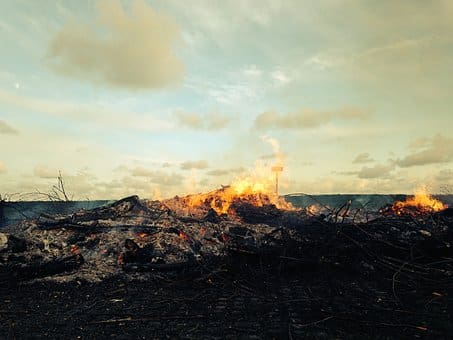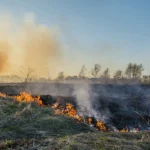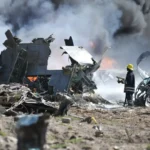The practice of disposing of waste via burn pits released harmful chemicals that left many military personnel vulnerable to chronic illnesses.
Summary
- The military used burn pits to get rid of trash, but the toxic fumes produced by the burn pits caused a host of health issues in service members who breathed in the smoke.
- For many years, veterans who served near military burn pits had difficulty claiming VA disability benefits for their illnesses because the VA did not acknowledge that they were service-connected.
- Several types of cancer, respiratory conditions, skin issues, and other medical problems are related to toxic exposure from military burn pits.
- The PACT Act addressed the need for compensation for illnesses caused by exposure to chemicals and toxins in the military, including those produced by burn pits.
Toxic Burn Pit Exposure: Securing Your VA Disability Benefits with VetLaw
Waste produced by military servicemembers on U.S. bases in certain locations may be difficult to properly and safely dispose of. When the U.S. military occupied Iraq and Afghanistan, the common procedure for disposing of waste was to burn it in open pits. This has been recognized as a highly dangerous practice.
Veterans who inhaled burn pit emissions have reported developing cancer, respiratory issues, and other service-related conditions as a result. VetLaw has been vocal about this issue from the start. Our veterans disability claims attorneys are continuing to advocate for qualified vets to receive PACT Act compensation for disabilities connected to toxic burn pit exposure.
We understand that in many cases, these VA disability benefits are long overdue. Our team specializes in veteran chemical and toxic exposure claims and we are here to help. Schedule a free consultation with us by calling (855) 964-1925 or completing our online contact form.
The Evolving Status of the Toxic Burn Pit Claims
The Department of Veterans Affairs (VA) continues to investigate the toxic chemicals active-duty military personnel are exposed to. The widespread use of open burn pits is causing more and more concern. The VA created a burn pit registry for veterans and servicemembers to report whether they were around a burn pit while active duty.
More than 180,000 people have registered. Currently, more than 12,000 claims have been filed with the VA involving disabilities connected to exposure to open burn pits. However, only around 2,500 have moved forward to trial.
The Special Inspector General for Afghanistan Reconstruction released a report in 2015 that stated troops were put at risk by harmful emissions from open burn pits. Further, it said the Department of Defense did not adequately plan or manage the disposal of waste at military locations.
Congress Paves the Way for Vets to Receive Disability Benefits for Conditions Linked to Toxic Burn Pit Exposure
The most significant piece of progress we have seen regarding VA disability claims based on toxic burn pit exposure is the PACT Act. The Promise to Address Comprehensive Toxics Act of 2022 tackled the government’s lagging response to disabled vets who suffered from service-related exposure to dangerous chemicals.
Toxic burn pits were among the major sources of exposure the legislation specifically acknowledged, in addition to Agent Orange and Camp Lejeune’s water supply. When the military accepts responsibility for a health hazard and the resulting medical issues, the VA usually adopts those injuries and illnesses as presumptive service-related conditions.
Since the PACT Act has been enacted, the VA has added presumptive conditions related to toxic exposure. For example, respiratory issues caused by burn pit exposure are assumed to be connected to military service. Now, it is easier for veterans to qualify for the disability benefits they rightfully deserve with the VA.
Chemicals Used in Burn Pits
The Department of Defense (DoD) has policies and guidelines for waste disposal in the military. Contracted workers must abide by them to ensure the safety of all involved parties. There are alternatives for waste disposal at international military bases.
However, the military still utilizes open burn pits when there are no other feasible options. When the military uses open burn pits, they can contain waste like batteries, heavy metals, plastics, medical waste, and tires. Additionally, burn pits can contain hazardous chemicals such as arsenic.
Supposedly, the military operates open burn pits in a manner that prevents or reduces risk to human health and the environment. However, evidence suggests the military is still using shortcuts. As a result, U.S. military servicemembers are still exposed to dangerous pollutants and chemicals.
In the study conducted by the Special Inspector General, it appears that contractors and government officers were not held accountable. They failed to adhere to regulations surrounding waste management. Consequently, this put additional military personnel at risk for exposure to the deadly byproducts contained in open burn pits.
Health Concerns Associated with Burn Pit Exposure
Between 2001 and 2011, over 1.5 million American troops were deployed to Iraq and Afghanistan. As the troops returned home and transitioned into civilian life, many started reporting health concerns related to burn pit exposure.
Thousands of veterans exhibited chronic medical issues likely linked to the release of dangerous toxins in overseas military locations. The most common burn pit health problems are cancer and respiratory illnesses.
Additional ailments reported by former service members exposed to open burn pits include skin, eye, and gastrointestinal issues. Unfortunately, those who came forward were met with disagreement. The VA was skeptical that the waste management tactic caused veterans’ poor health and denied many claims.
The Special Inspector General’s study notes that exposure to emissions from open-air burn pits could have lasting negative consequences. However, the military has yet to definitively ban the practice.
The study suggests the DOD should pay greater attention to waste management to prevent unnecessary harm to military service members. Additionally, the study recommends that the military should only burn pits when there are no alternatives.
Contact a Veteran Toxic Burn Pit Attorney Today to Learn More
The actions of the DoD and the lack of serious change mean that open-air burn pits will likely continue to affect the health of active-duty military personnel. If you or someone you love was exposed to the dangerous smoke or byproducts of an open-air burn pit while actively deployed, it is important that you seek legal counsel.
The team at VetLaw has experience with complex legal issues that involve Veteran Affairs and the Department of Defense. We can help you fight for the compensation you deserve. Our knowledgeable veterans disability claims lawyers can help you assess your case and pursue justice and compensation. Call us today for a free consultation today.
Frequently Asked Questions
How do I know if I was exposed to disease and chemicals from a military burn pit?
Unfortunately, military burn pits disbursed toxic fumes outside the area immediately surrounding the pit. That means military personnel who were downwind of a toxic burn pit could have inhaled the hazardous chemicals.
If you were stationed in a location where burn pits were in operation and you are experiencing symptoms of a presumptive disability associated with toxic exposure, you may have experienced toxic exposure during your military service. You should consult the VA’s registry questionnaire to determine your exposure risk.
Can I still apply for VA disability benefits under the PACT Act?
Yes, the PACT Act is here to stay. If you have a PACT Act presumptive condition and you can show that you were likely exposed to toxins from military burn pits, you can still apply for VA disability benefits. While the PACT Act will not expire, you should still be mindful of other deadlines in the VA appeals process.
Do I need a veterans disability claims lawyer to file an appeal if my illness is now a presumptive condition under the PACT Act?
Many veterans were originally denied benefits by the VA for a disease that now qualifies as a presumptive condition under the PACT Act. Having a presumptive status for a disability can be an advantage when seeking benefits. However, many vets still find the appeals process to be complicated.
A veterans disability claims denial attorney can help you avoid further delays by building a strong appeal. They will gather relevant evidence like a service record shows you sustained toxic burn pit exposure. Additionally, they can help ensure you have a medical diagnosis for your presumptive condition.







